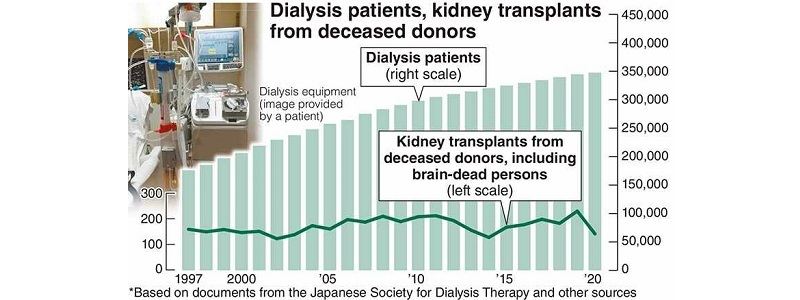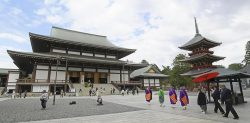Reality of overseas organ transplants / Patients struggle amid shortage of donors

Organs are removed from a patient.
The Yomiuri Shimbun
6:00 JST, August 25, 2022
In a recently publicized case of suspected organ trafficking, a living donor kidney transplant was conducted overseas with a Tokyo-based nonprofit organization acting as an intermediary. This is the fourth installment of a series on the current state of transplant operations carried out overseas.
Blood flows into a dialysis device through a tube to remove waste products, and the filtered blood is returned to the body. Dialysis patients typically go to the hospital three times a week and spend several hours in bed each time.
Michiko Abe, a 54-year-old employee of a nonprofit body in Yokohama, has lived this way for 40 years.
Abe was diagnosed with kidney disease and began dialysis when she was a junior high school student. After she started working, she initially received dialysis at night and worked during the day. However, in her 30s, she started feeling pain all over her body due to complications from dialysis, such as the buildup of protein in her joints. Ultimately, she had to quit her job.
Abe registered with the Japan Organ Transplant Network (JOT), which has been authorized by the government to mediate organ transplants. About 10 years later, she was contacted by a hospital asking if she would receive a transplant. She was told that two kidneys were available and there were several candidates, but she had the chance of receiving an organ if someone else declined.
However, Abe’s mother was in critical condition at the time, so she turned down the offer. A few years later, she was contacted again, but was unable to undergo the surgery due to a high fever. Since then, she has not heard from the hospital.
As a result of the complications, Abe became unable to freely move her arms and legs. Recently she cannot even open a plastic bottle or a bag of snacks.
“My body is falling apart,” she said. “I wonder if my life would have been different if I could’ve received a transplant early on.”
Seeking transplants overseas
Japan has a shortage of kidney transplant donors, which has caused some would-be recipients to turn to organizations such as the Intractable Disease Patient Support Association, a Tokyo-based nonprofit organization that mediates kidney transplants from living donors in developing countries.
According to the Japanese Society for Dialysis Therapy, the number of dialysis patients has continued to rise for such reasons as a growing number of people with diabetes. In 2020, a total of 40,744 people newly started dialysis, bringing the total number of dialysis patients to 347,671 at the end of the same year.
As of this June, 13,589 people were registered with the JOT to seek kidney transplantation from deceased donors, including brain-dead donors. However, only 125 kidney transplants were performed through the mediation of the JOT in 2021.
To receive a transplant from a donor who has died, a patient must register with the JOT. A transplant from a living donor requires approval from the ethics committee of the hospital that performs it.
The average waiting period for a kidney transplant is about 14 years and nine months, far longer than the approximately three years and four months for a heart transplant or about two years and five months for a lung transplant.
According to a survey, which was conducted last year by the Cabinet Office on 3,000 people age 18 or older, about 40% of respondents said they wanted to donate their organs after death or were inclined to donate them. However, only about 10% of the respondents had declared their intention to do so on their driver’s license, insurance card or other documents.
The Health, Labor, and Welfare Ministry and the JOT are working to bridge this gap through events and other activities to raise awareness, but the percentage of people who have indicated their intention to donate their organs remains stagnant at around 10%.
And even if a person who has indicated their intention to donate is declared brain dead, a transplant is not always performed because some hospitals are not prepared to handle such cases.
According to a survey carried out by the health ministry in March, only half of about 900 institutions that provide advanced medical care, including university hospitals, can perform operations to remove organs from brain-dead donors. The other half were sometimes unable to perform transplants even if there were potential donors, for such reasons as not having doctors who could determine brain death.

Japan lags behind
The number of organ transplants performed in Japan has been remarkably low compared to other countries.
According to tallies by the World Health Organization and other entities, Japan ranked 42nd, with 17.7 organ transplants performed per 1 million people in 2020. The United States topped the list with 120.5 transplants, followed by Spain with 94.7 and South Korea with 81.5.
In the United States, when patients die, medical professionals are legally required to explain organ donation to their families. There is no such provision in Japanese law. Explaining organ-donation procedures to families shortly after their loved ones have died puts a heavy burden on doctors, so it is believed that sufficient explanations have not been provided in many cases.
In South Korea, hospitals are obliged to provide organ donor agencies with information about patients who could be declared brain-dead, in order to facilitate transplants. Japan also lacks this kind of system.
“The current Japanese system doesn’t sufficiently accommodate the goodwill of people who want to donate their organs,” said Takashi Kenmochi, a professor at Fujita Health University who serves as an executive of the Japan Society for Transplantation. “It ‘s urgent to make improvements by referring to the systems of other countries.”

Most Read
Popular articles in the past 24 hours
-

Record Snowfall in Japan Causes Serious Agricultural Damage in To...
-

Japan Police Told to Boost Security, Vigilance Around U.S., Israe...
-

Japan Traditional Puppet Performance Held at Onsen Resort in Shiz...
-

U.S. Urges Citizens to Immediately Depart over A Dozen Middle Eas...
-

Strait of Hormuz Closure Shakes Markets; Prolonged Closure Could ...
-

Japanese Firms Ban Business Trips, Cancel Vacation Tours Amid Mid...
-

Joichi Ito’s Japan Government Role Uncertain Amid Fresh Epstein S...
-

2 of Japan's Opposition Parties Submit Bill to Revise Political F...
Popular articles in the past week
-

Milano Cortina 2026: Japanese Gold Medalist Figure Skater Miura S...
-

Tokyo Spends Big on Children, Wins Over Parents
-

Japan’s Miura, Kihara Announce Withdrawal from Figure Skating Wor...
-

Exhibition Featuring Yoshiharu Tsuge’s Manga World Underway in Ch...
-

Yokohama to Test Out Renewable-Powered Offshore Floating Data Cen...
-

BOJ Keeping Eye on Economy and Takaichi's ‘Proactive Fiscal Polic...
-

Tokyo Measles Patient Traveled to Fukuoka Aboard JAL Planes; Susp...
-

Japan Seeks to Counter China's Expanding Influence in Pacific by ...
Popular articles in the past month
-

Producer Behind Pop Group XG Arrested for Cocaine Possession
-

Japan PM Takaichi’s Cabinet Resigns en Masse
-

Man Infected with Measles Reportedly Dined at Restaurant in Tokyo...
-

Israeli Ambassador to Japan Speaks about Japan’s Role in the Reco...
-

Videos Plagiarized, Reposted with False Subtitles Claiming ‘Ryuky...
-

Man Infected with Measles May Have Come in Contact with Many Peop...
-

Prudential Life Insurance Plans to Fully Compensate for Damages C...
-

Woman with Measles Visited Hospital in Tokyo Multiple Times Befor...
Top Articles in Society
-

Producer Behind Pop Group XG Arrested for Cocaine Possession
-

Man Infected with Measles Reportedly Dined at Restaurant in Tokyo Station
-

Man Infected with Measles May Have Come in Contact with Many People in Tokyo, Went to Store, Restaurant Around When Symptoms Emerged
-

Woman with Measles Visited Hospital in Tokyo Multiple Times Before Being Diagnosed with Disease
-

Bus Carrying 40 Passengers Catches Fire on Chuo Expressway; All Evacuate Safely
JN ACCESS RANKING
-

Producer Behind Pop Group XG Arrested for Cocaine Possession
-

Japan PM Takaichi’s Cabinet Resigns en Masse
-

Man Infected with Measles Reportedly Dined at Restaurant in Tokyo Station
-

Israeli Ambassador to Japan Speaks about Japan’s Role in the Reconstruction of Gaza
-

Videos Plagiarized, Reposted with False Subtitles Claiming ‘Ryukyu Belongs to China’; Anti-China False Information Also Posted in Japan








